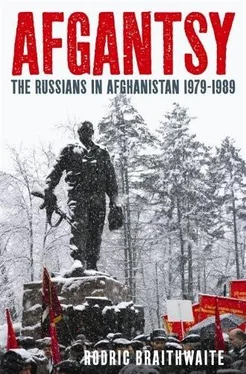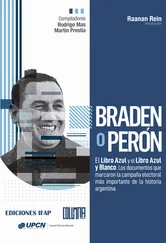The Politburo met on 17 March. Neither the Soviet Union nor its elderly leadership were in a good shape to cope with the crisis that was now thrust upon them. By the 1970s the Soviet Union was already decaying from within. Its institutions were essentially the same as those which Stalin had forged, but they were ill-adapted to an increasingly complex world. Perceptive observers, even inside the Soviet government, could see the extent of the decline only too clearly. But few people drew any far-reaching conclusions. In 1979 the Soviet Union looked to the West as though it would remain a serious military and ideological threat for a long time to come.
The leaders were gloomy, cautious, and hampered by the fact that they had little idea what was actually happening. The main opinions were voiced by Gromyko, by the Prime Minister, Aleksei Kosygin, by the Defence Minister, Dmitri Ustinov (1908–84), and by the Chairman of the KGB, Yuri Andropov (1914–84). These were all able men. But they were of Gromyko’s generation, they too had begun their careers under Stalin, and their thinking was still locked in the orthodox Marxist-Leninist stereotypes of the day. They were not to be looked to for innovative solutions.
Leonid Brezhnev, the General Secretary of the Soviet Communist Party, did not join in the initial discussions, although several of the participants consulted him individually. He had been in power for fifteen years and more. His health was already failing, and towards the end he became a figure of fun, in private of course, to the wits of the Moscow intelligentsia. But whatever the state of his health in the last year or two of his life, at this stage he still retained his authority and his word was in the end decisive.
For four long days the leaders worried away at some almost intractable problems. What was the real Soviet interest in Afghanistan? What could the Russians do about the deviousness, brutality, and incompetence of their Communist allies in Kabul? How should they react to Kabul’s increasingly desperate pleas for Soviet troops to help put down the insurgency?
And all the time they had in their minds the Cold War background which in so many ways underlay and distorted the policymaking process in Moscow, just as it did in the capitals of the West. Brezhnev had hoped that détente, the relaxation of tension with the West, would figure as one of the great achievements in his historical legacy. Things had started well enough. The Helsinki Treaty of 1975 seemed to offer a way of reducing tension and regulating the East–West relationship in Europe. The SALT II negotiations for further limitations on US and Soviet stocks of intercontinental ballistic missiles were moving towards completion. But then things had started to go wrong. The likelihood that the Senate would ratify SALT II was receding. The row over the deployment by the Russians of SS-20 medium-range missiles in Europe was growing, as the Americans sought with increasing success to persuade their European allies to allow the matching deployment of their Pershing II missiles.
More pertinently, the Americans would surely not take lying down their humiliation in Iran, where their close ally the Shah had been ousted. Might they not see Afghanistan as some kind of substitute for Iran as a base from which to threaten the Soviet Union? Might they not move into Afghanistan if the Soviets moved out? They had sent a carrier battle group into the western Indian Ocean, ostensibly in case of more trouble in Iran; but might the ships not be equally useful to further American intentions in Afghanistan as well? The Russians did not of course know that the Americans had been considering how to support the Afghan rebellion against the Communists even before the Herat rising. But the logic of the Cold War meant they were in any case bound to react to American moves on their sensitive southern border, just as the Americans had been bound to react when the Russians put offensive missiles in Cuba. The Russians could no more abandon Afghanistan than the Americans had felt able to abandon Vietnam in the 1950s and 1960s. These painful parallels did not make it any easier for the Russian leaders to reach decisions in a situation which risked ending badly whatever they did.
The men in the Politburo were in no doubt that the Soviet Union would have to stick with Afghanistan come what may. The two countries had been close for sixty years and it would be a major blow to Soviet policy if Afghanistan was now lost. The trouble was that, as they started their discussions on that March day, they still had little idea what was happening on the ground. The Afghan leaders were not being frank about the true state of affairs, complained Kosygin. He demanded that Ambassador Puzanov should be sacked, and suggested that Ustinov or General Ogarkov, the Chief of Staff, should go to Kabul immediately to discover exactly what was happening.
Ustinov sidestepped the proposal. Amin, he said, had abandoned his earlier optimism and was now demanding that the Soviet Union should save the regime. But why had it come to that? Most of the soldiers in the Afghan army were devout Muslims and that was why they were deserting to the rebels. Why had the Afghan government not taken sufficient account of the religious factor earlier?
Andropov added a devastatingly bleak analysis. The main problem was the weakness of the Afghan leadership. They were still busy shooting their opponents and then had the cheek to argue that in Lenin’s day the Soviets had also shot people. They had no idea what forces they could rely on. They had failed to explain their position either to the army or to the people at large. It was perfectly clear that Afghanistan was not ripe for socialism: religion was a tremendous force, the peasants were almost completely illiterate, the economy was backward. Lenin had set out the necessary elements of a revolutionary situation. None were present in Afghanistan. Tanks could not solve what was essentially a political problem. If the revolution in Afghanistan could only be sustained with Soviet bayonets, that was a route down which the Soviet Union should not go.
Gromyko was beginning to boil over. The lack of seriousness with which the Afghan leaders treated complicated matters was like something out of a detective story. The mood of the Afghan army was still unclear. Suppose the Afghan army came out against the legitimate government and against any forces the Soviet Union might send in? Then, as he delicately put it, ‘the situation would become extremely complex’. Even if the Afghan army remained neutral, the Soviet forces would have to occupy the country. The impact on Soviet foreign policy would be disastrous. Everything the Soviet Union had done in recent years to reduce international tension and promote arms control would be undermined. It would be a splendid present for the Chinese. All the non-aligned countries would come out against the Soviet Union. The hoped-for meeting between Brezhnev and President Carter (1924–) and the forthcoming visit of the French President, Giscard d’Estaing, would be put in question. And all the Soviet Union would get in exchange was Afghanistan, with its inadequate and unpopular government, its backward economy, and its insignificant weight in international affairs.
Moreover, Gromyko confessed, the legal basis for any Soviet military intervention was shaky. Under the UN Charter, a country could ask for external assistance if it had been the victim of aggression. But there had been no such aggression. What was going on was an internal struggle, a fight within the revolution, of one group of the population against another.
Andropov weighed in forcefully. If Soviet forces went in, they would find themselves fighting against the people, suppressing the people, firing upon the people. The Soviet Union would look like aggressors. That was unacceptable. Kosygin and Ustinov agreed. Ustinov went on to report that the Soviet military were already doing some prudent contingency planning. Two divisions were being formed in the Turkestan Military District and another in the Central Asian Military District. Three regiments could be sent into Afghanistan at short notice. The 105th Airborne Division and a regiment of motorised infantry could be sent at twenty-four hours’ notice. Ustinov asked for permission to deploy troops to the Afghan frontier and carry out tactical exercises there to underline that Soviet forces were at high readiness. He was, he nevertheless reassured his listeners, as much against the idea of sending troops into Afghanistan as everyone else. Anyway, the Afghans had ten divisions of troops, and that should be quite enough to deal with the rebels.
Читать дальше












